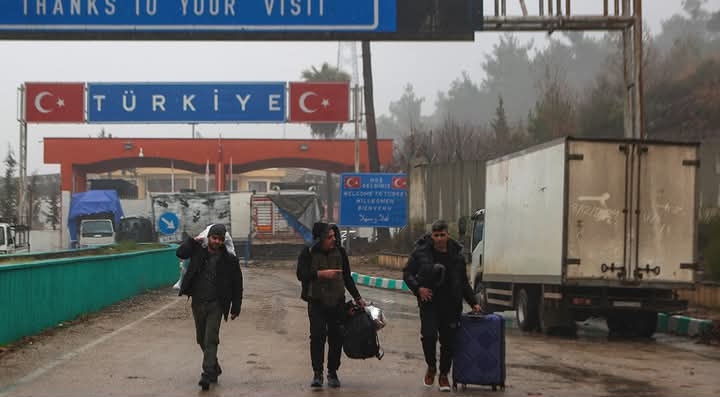By Adeyemi Adekunle
A man clutches a battered suitcase, his wife balancing a toddler on her hip as they tread cautiously through the Kassab crossing. Behind them, a trail of footsteps marks a journey they once thought impossible—returning home to Syria. This scene, playing out thousands of times since the fall of President Bashar al-Assad earlier this month, encapsulates the fragile hope of a nation yearning for a new chapter.
Turkey’s Interior Minister, Ali Yerlikaya, announced Friday that nearly 31,000 Syrians have crossed back into their homeland. These are not just numbers but stories of resilience, of families torn apart by a decade-long war now daring to believe in the promise of stability. Turkey, which has sheltered nearly three million Syrian refugees, finds itself at the crossroads of relief and responsibility as its southern neighbor begins to reshape its destiny.
Yet the return home is not a triumphant march. The roads to Syrian towns and villages are lined with memories of destruction—buildings reduced to rubble, schools silent, fields fallow. But amidst the scars of war, there is movement: Turkey has pledged to help restore Syria’s power infrastructure, a symbolic and practical step toward a brighter future. Energy Minister Alparslan Bayraktar emphasized Turkey’s commitment to aid, saying, “We are ready to light the way for Syria’s recovery.”
The world, too, is watching—and stepping in. Fifty tons of European Union-funded medical supplies are poised to enter Syria via Turkey, marking a small but crucial victory for the country’s healthcare system, which was battered during Assad’s regime. “The supplies are essential for rebuilding a system that serves a vulnerable population,” said Mrinalini Santhanam, a World Health Organization official overseeing the logistics.
In an unexpected gesture of solidarity, Ukraine has sent 500 tons of wheat flour to Syria. Announcing the shipment, Ukrainian President Volodymyr Zelenskyy framed it as a bridge of humanity between two war-torn nations. “We understand the pain of conflict,” he said, “and we stand with the Syrian people in their time of need.”
But this fragile recovery does not come without shadows. Iran, a steadfast ally of the former Assad regime, has cautioned against foreign meddling in Syria’s future. Writing in the Chinese state newspaper *People’s Daily*, Iranian Foreign Minister Abbas Araghchi stressed, “Syria’s destiny must be determined by its people, free from external interference.” The statement reflects the delicate balance of power in the region, where competing interests could either aid or undermine Syria’s fragile steps forward.
As international aid trickles in, Syrians on the ground face the harsh realities of rebuilding not just their homes, but their lives. The returnees carry more than luggage; they carry the weight of dreams deferred, of children who’ve known nothing but exile, of the silent hope that perhaps, this time, the promise of peace will hold.
“We left in the night, our house burning,” said Amina, a mother of four, who has lived in a Turkish refugee camp since 2015. “Now, we come back to nothing but ashes. But still, it is home.”
For some, returning is not an option. Critics warn that many parts of Syria remain unsafe, with sporadic violence, a lack of infrastructure, and a volatile political landscape. Humanitarian organizations have called for caution, emphasizing the need for conditions that make returning truly voluntary and sustainable.
The international community faces a delicate task. While the world may see Assad’s fall as the end of an era, Syrians know that real change requires more than the toppling of a regime. It demands rebuilding trust in institutions, fostering unity among fractured communities, and ensuring that the next generation can dream beyond survival.
Even as Syrians take these tentative steps forward, they do so in a world that has not yet settled its own approach to their nation’s future. Will foreign aid uplift, or will geopolitical rivalries pull Syria back into chaos? For every border crossed and every promise made, the answer remains elusive.
And yet, for those like Amina, trudging through the Kassab crossing, the act of returning is itself a declaration of faith. Faith that homes can be rebuilt, that children can laugh in the streets again, and that the story of Syria will not end in despair but in resilience.
In the coming months, as trucks laden with supplies rumble into Syria and more families cross its borders, the world will watch with bated breath. The fall of Assad was the spark—but can it light the fire of a nation’s rebirth?




